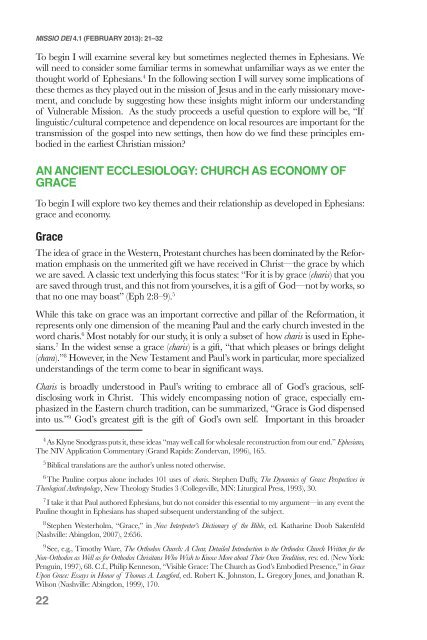VULNERABLE MISSION
VULNERABLE MISSION
VULNERABLE MISSION
You also want an ePaper? Increase the reach of your titles
YUMPU automatically turns print PDFs into web optimized ePapers that Google loves.
MISSIO DEI 4.1 (FEBRUARY 2013): 21–32<br />
To begin I will examine several key but sometimes neglected themes in Ephesians. We<br />
will need to consider some familiar terms in somewhat unfamiliar ways as we enter the<br />
thought world of Ephesians. 4 In the following section I will survey some implications of<br />
these themes as they played out in the mission of Jesus and in the early missionary movement,<br />
and conclude by suggesting how these insights might inform our understanding<br />
of Vulnerable Mission. As the study proceeds a useful question to explore will be, “If<br />
linguistic/cultural competence and dependence on local resources are important for the<br />
transmission of the gospel into new settings, then how do we find these principles embodied<br />
in the earliest Christian mission?<br />
AN ANCIENT ECCLESIOLOGY: CHURCH AS ECONOMY OF<br />
GRACE<br />
To begin I will explore two key themes and their relationship as developed in Ephesians:<br />
grace and economy.<br />
Grace<br />
The idea of grace in the Western, Protestant churches has been dominated by the Reformation<br />
emphasis on the unmerited gift we have received in Christ—the grace by which<br />
we are saved. A classic text underlying this focus states: “For it is by grace (charis) that you<br />
are saved through trust, and this not from yourselves, it is a gift of God—not by works, so<br />
that no one may boast” (Eph 2:8–9). 5<br />
While this take on grace was an important corrective and pillar of the Reformation, it<br />
represents only one dimension of the meaning Paul and the early church invested in the<br />
word charis. 6 Most notably for our study, it is only a subset of how charis is used in Ephesians.<br />
7 In the widest sense a grace (charis) is a gift, “that which pleases or brings delight<br />
(chara).” 8 However, in the New Testament and Paul’s work in particular, more specialized<br />
understandings of the term come to bear in significant ways.<br />
Charis is broadly understood in Paul’s writing to embrace all of God’s gracious, selfdisclosing<br />
work in Christ. This widely encompassing notion of grace, especially emphasized<br />
in the Eastern church tradition, can be summarized, “Grace is God dispensed<br />
into us.” 9 God’s greatest gift is the gift of God’s own self. Important in this broader<br />
4 As Klyne Snodgrass puts it, these ideas “may well call for wholesale reconstruction from our end.” Ephesians,<br />
The NIV Application Commentary (Grand Rapids: Zondervan, 1996), 165.<br />
22<br />
5 Biblical translations are the author’s unless noted otherwise.<br />
6 The Pauline corpus alone includes 101 uses of charis. Stephen Duffy, The Dynamics of Grace: Perspectives in<br />
Theological Anthropology, New Theology Studies 3 (Collegeville, MN: Liturgical Press, 1993), 30.<br />
7 I take it that Paul authored Ephesians, but do not consider this essential to my argument—in any event the<br />
Pauline thought in Ephesians has shaped subsequent understanding of the subject.<br />
8 Stephen Westerholm, “Grace,” in New Interpreter’s Dictionary of the Bible, ed. Katharine Doob Sakenfeld<br />
(Nashville: Abingdon, 2007), 2:656.<br />
9 See, e.g., Timothy Ware, The Orthodox Church: A Clear, Detailed Introduction to the Orthodox Church Written for the<br />
Non-Orthodox as Well as for Orthodox Chrisitans Who Wish to Know More about Their Own Tradition, rev. ed. (New York:<br />
Penguin, 1997), 68. C.f., Philip Kenneson, “Visible Grace: The Church as God’s Embodied Presence,” in Grace<br />
Upon Grace: Essays in Honor of Thomas A. Langford, ed. Robert K. Johnston, L. Gregory Jones, and Jonathan R.<br />
Wilson (Nashville: Abingdon, 1999), 170.


